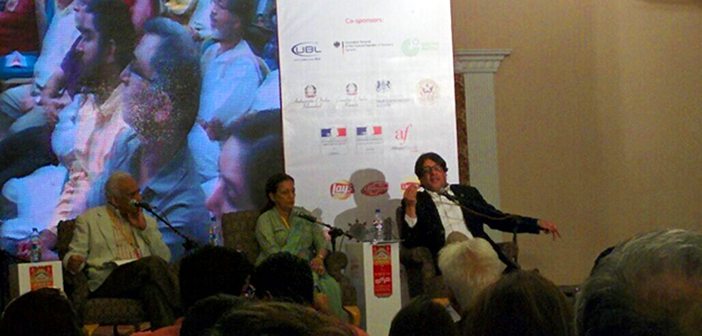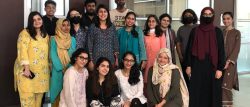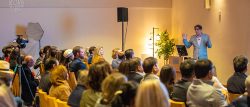Senior educationists, including IBA’s Dr. Ishrat Husain and SZABIST’s Shahnaz Wazir Ali, posit faith in the potential of Habib University
KARACHI LITERATURE FESTIVAL, February 7, 2016: Senior educationists taking part in a panel discussion at the 7th Karachi Literature Festival spoke strongly in favor of Habib University’s mission and its novel liberal arts model of education as holding the key to the future of higher education in Pakistan.
A panel comprising Dr. Ishrat Hussain, Dean and Director of the Institute of Business Administration (IBA), Ms. Shahnaz Wazir Ali, Acting President of SZABIST, Mr. Talib Syed Karim, Rector of the Institute of Business Management (IoBM) and Mr. Wasif Rizvi, President of Habib University, was discussing the topic “Higher Learning or the Wholesaling of Degrees?” moderated by Mehtab S. Karim in one of the penultimate sessions of the three-day festival.
Examining the short-comings of Pakistan’s higher education system in comparison to its regional peers, the speakers touched on important issues like the availability and accessibility of quality education, the financial barriers preventing young Pakistanis from getting degrees, and the demand-supply gap between employable workers and university graduates.
Dr. Hussain initiated the discussion with a citation from a recent McKinsey report on India’s universities, which says that only 10% of all graduates from the top universities in India can be considered world-class, 40% have some employability in the local market, while 50% are not employable at all. Extrapolating the report’s findings to Pakistan, he said one could see a similar picture emerge in our country. Nonetheless, Dr. Hussain took heart in the fact that lots of universities had raised their standards and made efforts to produce high-quality graduates, whereas 10 years ago only LUMS, IBA and AKU could promise some measure of global quality education. “I am quite happy that we now have Habib University – a state-of-the-art institution that offers social sciences with engineering,” he remarked while discussing the evolution of Pakistan’s higher education landscape.
Ms. Shahnaz Wazir Ali, who was next to speak, questioned whether universities were supposed to only produce workers. She said the purpose of university education was to create knowledge, yet Pakistani universities were still not really focusing on that. She said universities should be focused on creating individuals who could adopt and adapt to the modern world, and that universities with a clear focus on doing this have a very important role to play. Here, she praised Habib University for having a very clearly defined mission, which – when combined with good faculty and excellent degree programs – had the potential to yield excellent outcomes.
Mr. Wasif Rizvi said the problem lies in the perception of private institutions as some sort of money-making enterprise, when this is not actually the case. He recounted how, in his discussions with the accreditation body that assesses top American universities, he had found that private universities are actually designed to lose money. This is because high-quality private institutions should demonstrate that the wider public is willing to take a stake in their future.
If we can adopt a sensible system of public support for private universities, we can address the cynicism regarding private universities.
Discussing why Habib University had adopted the Liberal Arts model, Mr. Rizvi said that one can be a fully functional human being without having an MBBS degree or an MBA, but not if one does not understand their own history. “We want our students to understand this place [Pakistan], and deal with it,” he explained. Ms. Shahnaz later concurred with Mr. Rizvi’s assertion, saying “Only a Liberal Arts university is going to bring change” in Pakistan.
Later, in the question-and-answer session, the speakers were asked different questions regarding the accessibility of higher education institutions for the middle and lower middle classes, to which the speakers recounted how IBA, LUMS, AKU and Habib University were subsidizing education in varying degrees for those who needed it. Mr. Rizvi acknowledged that much needed to be done, but that Habib University had already initiated programs to address the most pressing concerns of those who felt that attaining a world-class degree was out of their reach.




